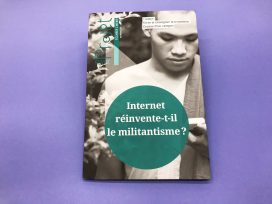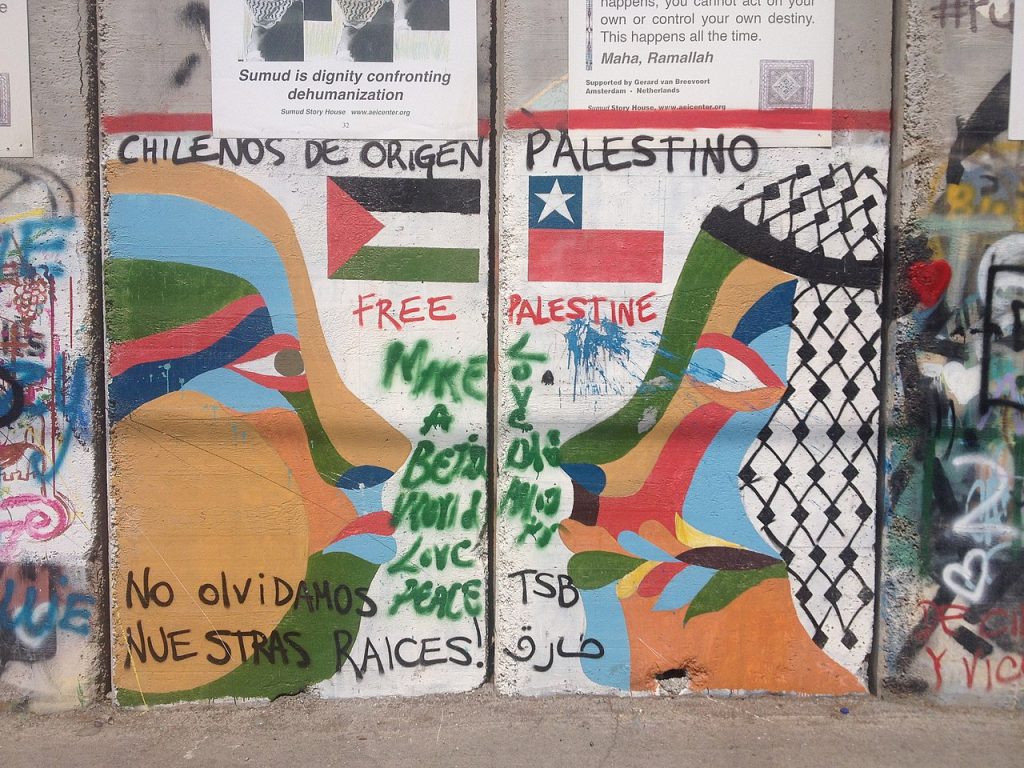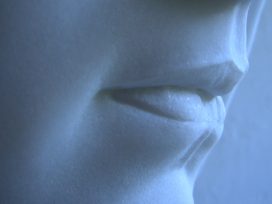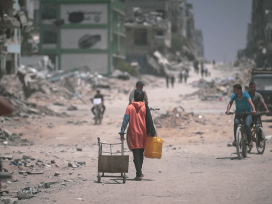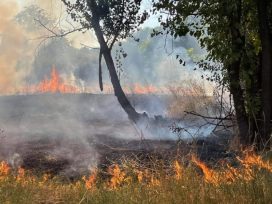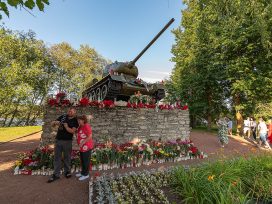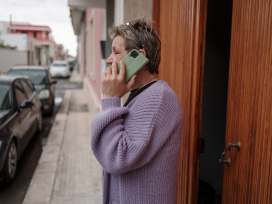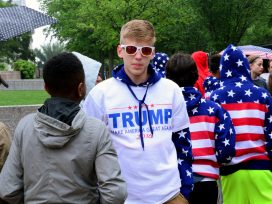LEBANON 2011. I’d moved to Lebanon to study, after the Israelis had banned me from re-entering Palestine. A friend had already arrived a few weeks before me. Hearing of an apartment for rent in Ashrafiyyeh, she went to check it out. The conversation was, as she later reported, absolutely lovely: after handshakes, the landlord offered her tea and sweets and wanted to know everything about her Catholic family in Spain. Then they asked about the potential roommate; the word ‘Palestinian’ fell like an evil spell cast upon the room. The landlord ceremoniously washed his hands with bleach before kicking her out of the apartment.
In those early months, Hassan Nasrallah would appear on TV from an undisclosed location, lauding the protests erupting across Arab cities, gleefully rejoicing in the long-overdue tyrant-toppling fury. This felt like an opening, and Palestinians across Lebanon, charged with the feeling that change was possible, jumped at the chance – a march of return, where we would charge the border and maybe even step foot in our own country. The organizing began, people reached out to one another, old networks were rekindled, and existing ones shifted to the new priority. Nasrallah’s de facto authority in southern Lebanon was open to the idea; even the regime that backed it from Damascus saw this as an opportunity to prove its pro-Palestinian-liberation credentials.
Just a few years before I got to Lebanon, residents of the Nahr al-Bared camp were still not allowed back into their camp. Being the northernmost camp in the country, it had been spared when Israel invaded in 1982. But later it had been levelled by the Lebanese army in 2007 after a few dozen armed Islamists set up base there. When I first saw an aerial photo of Nahr al-Bared after the ‘terrorists’ had been routed, I thought I was looking at a photo of an overused ashtray with the cigarette butts removed. The huge billboards lionizing the Lebanese army that were put up all over the country while the camp was being annihilated were still everywhere, defacing the landscape alongside every highway.
Like so much of what we think of as the path to liberation, the idea that the Arab world will somehow come together to free us is a holdover from a different time – one that had passed before most of us alive today had taken our first steps. During the now romanticized years of ‘the Revolution’, it was thought that we’d all take up arms in the common cause and defeat the colonizer, before restoring our lost paradise of rivalries between clans and patriarchs. We’d do a dabke as we carried our olives to the press, sing a dal’ona as we rub the olive oil into our hair, nibble on a khubbeizeh starter, before plunging into a platter of msakhan for the main, knafeh for dessert.
Israel invaded Lebanon the year after I was born. Throughout the eighty days in which Palestinian and Lebanese fighters held off the invasion, that great supporter of the Palestinians, Muammar Gaddafi, issued regular radio broadcasts expressing something to the effect of ‘we will fight to the last Palestinian’. Two decades before that, that other great pro-Palestinian Arab regime, Damascus, decided to name its dungeon for political prisoners ‘the Palestine branch’. It carried that name right up to the demise of the Assad family’s reign, which used it to torture and disappear anyone suspected of harbouring dissent.
Two years into the Arab uprisings, Saudi filmmaker Haifaa al-Mansour released her film Wadjda, about a girl from Riyadh who enters a Quranic recitation contest to buy herself a bicycle. Wadjda wins, only to have her prize confiscated for a worthier cause: ‘Palestine’. This is what Palestine evokes across the Arab world: the combination of a charity case that has already asked for and taken too much, and the essence of why others can’t have their own freedom.
There are various ways to categorize Palestinians. Palestinians themselves generally want to know where your father’s father’s father (and so on) is from, information we can often glean from a surname, a party trick that rarely fails to impress. Then there’s the more common system, one that non-Palestinians have increasingly clued into, in which we are grouped according to date. First are the ’48 Palestinians, who acquired Israeli citizenship after somehow managing to stay within the part of Palestine that the Zionists claimed as Israel in 1948 – what we usually refer to as ‘Palestine, inside’. Those in this category have had to contend with the erasure of their identity for over seventy years, while also being considered suspect by other Arabs because they sprinkle Hebrew words over their shamenet and what not.
Then there are the ’67 Palestinians, those in the West Bank and Gaza Strip who experience direct military occupation. With the Oslo agreements of the early ’90s, the PLO’s chief, Yasser Arafat, agreed to become Israel’s first line of defence by setting up a non-state called the Palestinian Authority. The main job of this semi-fictional edifice has been to keep Palestinians in check on behalf of Israel, while chasing after an impossible statehood – a rotting carrot on a very long, very spiky stick.
Most of us, though, are refugees, meaning that we don’t get designations like ’48 or ’67 – even though those years were when most of our families were expelled or, like my father, not allowed back in. And so we are referred to by the country we ended up in. Each comes with its own baggage. A ‘Palestinian of Lebanon’ means you are likely to have been treated as a security threat for most of your life, denied access to work in most professions, and continually blamed for anything that ever went wrong (although Syrians have also got their fair share of scapegoating over the years). A ‘Palestinian of Jordan’ means you will have kept any Palestinian-ness to yourself and have taken extra care when passing it on to your children, lest your status as member of an ungrateful majority rub the right person up the wrong way.
Being a ‘Palestinian of Syria’, like a ‘Palestinian of Iraq’, used to mean that you were ‘one of the lucky ones’, because you generally faced the same degree of poverty and repression as other Syrians and Iraqis (and most Arabs). But that changed after 2011, when the Syrian regime started flattening refugee camps (much like what had happened in Iraq in 2003). While Syrian refugees were allowed out of the country, those tagged as Palestinian ended up in displacement camps scattered across the non-places between desert borders.
Then there were ‘Palestinians of Libya’. In his support for Palestinian liberation, Muammar Gaddafi was so opposed to the sham of the Oslo accords that he decided to take decisive action. ‘Oh, so you think they’ve offered you a state?’ he asked Arafat. ‘Well in that case I’ll just send you all the Palestinians I have.’ The great Liberator then expelled all the Palestinians from Libya, who of course were not allowed anywhere and ended up stuck on ships in the Mediterranean or on Libya’s desert border with Egypt.
My own categorization of Palestinians follows what I think of as circuits. There are Palestinians who pretty much live in or near the same place they were born; then there are Palestinians who have a travel arc. There’s the turn-of-the-20th-century migration arc; largely Christian Palestinians who migrated to the Americas and now form well-established communities with their own churches and football teams. This is a significant part of the global Palestinian population. In Chile, for example, there are more Palestinians than in Syria, Lebanon and Iraq combined. They are more likely to be wealthy, and over the years to have supported tyrants like Menem, Pinochet and Trump – though they have also included some notable oppositional figures such as Antoine Daoud, who fought in the Cuban revolution, and the anti-Pinochet filmmaker Miguel Littín, whose family is described in Gabriel Garcia Marquez’s Clandestine in Chile as being from ‘Beit Sagur’ (Beit Sahour, down the hill from Bethlehem).
Then you have the PLO circuit. These are the compatriots that jumped on the PLO train in Jordan before 1971, or in Lebanon soon after that. After Israel’s 1982 invasion of Lebanon, many of them ended up as PLO bureaucrats in the Maghreb, or fending for themselves in European cities like Malmo or Berlin. Here I also include the thousands of Palestinians who were sent on scholarship to the Soviet bloc, married someone with a name like Svetlana and stayed there, though you could nit-pick and give them their own category.
My own circuit is another biggie: the Men in the Sun circuit. When oil production created a massive need for workers in the Gulf, droves of Palestinians flocked there, and though almost none of them received any kind of citizenship, they could legally work and send money to their families – providing they didn’t do anything crazy, like try to join a labour union. But when grand chief Arafat decided to support Saddam Hussein’s invasion of Kuwait in 1991, hundreds of thousands of them were forced to leave. We went to places like Iraq and Jordan in the hope of later moving to Europe and Turtle Island (aka ‘North America’). My family ended up in Canada. It took about seven years to get citizenship, and as soon as I had it, I dropped everything and moved to Palestine to get to know my aunts and cousins.
Palestinians with ‘good’ passports from European countries, or one of their White settler-colonies, often celebrate the freedom to visit the homeland that these bring. But there’s a bitterness to it if your palette is paying attention. It was only by gaining membership to another genocidal project that had devastated the ancestral homelands of indigenous Americans that I could get past the border surrounding my own ancestral homeland. And it was only by getting past that border that I could see for myself what that kind of devastation looks like, seeing it with new eyes whenever I’ve gone back to Turtle Island.
Settler colonial regimes (and their imperial ‘mother countries’) all seem to be best friends, describing their bonds as ‘special relationships’. Less so indigenous peoples. Many a Palestinian I’ve met still refers to ‘red Indians’ or ‘Indians with feathers in their heads’, in the past tense; no recognition that these are living, breathing, fighting communities much like ours. It’s mutual, too. A delegation of indigenous teachers from Canada sent on a trip to Israel returned saying that by reviving the ancient language and restarting from scratch, Israel was the model for what indigenous peoples could achieve.
I remember being struck by the absurdity of this situation at a talk I once moderated. The first speaker was a Kanien’kehá:ka (‘Mohawk’) elder from Kahnawake, who spoke at length about how Canada had devastated her community. The next speaker was a Levantine academic whose blog had made him a famously angry defender of all things Arab, especially ‘the primary cause of the Arabs’ (i.e. Palestinian liberation). Slouching in his sweatpants, the indomitable scholar-militant proceeded to read off ten points that ‘make Palestine exceptional as a struggle’. Every one of those nowhere-else-in-the-world statements applied, as they still do, to the Kanien’kehá:ka nation; and every way in which they did so had been described in detail just minutes before by the woman sitting beside him.
*
While I was in Palestine, one of my aunts decided to take me to Gaza. She hadn’t been there in decades and wanted to see the sea. Our colourful summer clothes and my aunt’s uncovered hair confused the soldiers at the desolate Erez crossing. ‘Yehudim?’ they asked. ‘Lo,’ we answered. My western passport meant I used a separate crossing. We were greeted on the other side by a familiar sight: a long line of taxi drivers in dire need of a fare. After a short scuffle about whose turn it was to take the next passenger, one driver beat the bunch by opening his car doors and ushering us in, speeding away from the din of other cabbies and swearing as soon as we were inside.
Where to?
Just drive us around and show us Gaza City, it’s my first time here and she hasn’t been here in years.
But make sure to take us to the sea, I want to see the sea.
You got it.
Years later, I would ask a group of 14-year-olds in Ramallah if any of them had seen the sea. After a long silence one student raised her hand and told us she’d seen it in Birzeit. Birzeit is landlocked, but it has one of the few public swimming pools in the area.
Two crystal-clear memories of my day in Gaza City stand out. One: eating a slice of bell pepper served on top of the hummus we had by the sea only to discover it was a hot chili and my mouth burning for the rest of the day. My aunt and I still laugh when we remember this. Two: the driver showing us tall buildings, and sometimes clusters of tall buildings, and telling us that each was owned by a First Intifada-era collaborator. It was as if we’d asked to see not just the sea and the Great Mosque on Omar al-Mukhtar Street, but all the rewards Arafat had distributed to those who had betrayed their compatriots to the Israelis, culminating in the opulent ‘Madame’s Chalets’ on the sea (the ‘Madame’ in question being Arafat’s wife, who rarely leaves Paris).
So, you must really detest Arafat after all this.
What? No, we worship Arafat, he’s our everything.
Bewildered: How come?!
We grew up on him, his picture, his stories… Arafat is Palestine.
*
LEBANON 2011. The organizing for the Return march had taken a strange turn. The women and young people who had been leading the initiative had been replaced by old men from the factions. By the time we got to the last coordination meeting, the change had etched itself on the topography of the meeting hall. The Abu’s were seated behind tables arranged as a U, its opening facing the rest of us, as if we were an audience there to watch the show.
They had passed down the arrangement for how the day at the border would go: we were to stay at the top of the hill facing the barbed wire fence in the valley, where those expelled northwards in 1948 had crossed into their new lives as refugees. A man from each faction and organization would give a speech on how Israel is bad and the struggle is good, then we’d get back on the buses and head… home. Leaders were assigned the task of ensuring those from their faction, camp or neighbourhood would follow the programme.
Before I moved to Lebanon, I felt like I’d discovered the silver bullet to freedom. The problem with the whole peace framework was that it excluded the seven out of ten Palestinians who are either refugees or citizens of Israel. By mobilizing for return – the return of those displaced to their homes, the return of the fragmented Palestinian body to itself as one, the return to some kind of mass and inclusive accountability for whoever claimed to represent us – we might just have a shot at meaningful liberty.
I put everything into connecting with others who wanted to put return back at the top of the liberation movement agenda. This took the form of conference after conference, where we would gather to plan activities to be carried out in our respective locations of dispersal. I was always the youngest person there. Most participants knew one another from some revolutionary moment or another, usually by their noms de guerre – Abu this or Abu that.
I couldn’t believe that I was in the presence of people I’d read about, people who remembered the forests of Ajlun, the battle of Wehdat, the trenches of al-Rashidiyyeh, Miyyeh w Miyyeh, Shqaif and Khaldah, the barricades of Jabaliyah, Balata, Qalandiah and Dheisheh. I got to stay up late, smoke red Marlboros and imbibe Black Label with these men (all men), their gruff voices echoing the memories of barricades and fallen comrades.
Before Cyprus joined the Schengen Zone it was one of the few places where Palestinians could congregate; its mid-range hotels were a common venue for such gatherings. At one of those conferences, on the balcony of one of those hotels, I found myself pulling an all-nighter with one of the Fateh brothers. He was in his early fifties, the second youngest person in attendance. He’d just opened the second bottle of ‘Black’, which occasioned dumping the heap of cigarette butts from the oversized ashtray into a plastic bag so we could start afresh.
The sun would be coming up soon, but a long silence had set in because of something I’d said: Oslo was a second Nakba, our liberation movement leadership signed on to becoming our prison warden, the first line of defence for the occupation itself. They’ve given up on us refugees, on our people inside, they’re just lining their pockets and waiting for Israel’s lowest offer, so that they can sell off the rest of what they haven’t sold already.
My companion poured a generous splash of the blended scotch into each of our glasses, unwrapped a fresh pack of cigarettes and offered me one, lighting it before his. The Soviets had gone belly up and it was America’s world; they had taken out Saddam and set up camp throughout the Gulf. We Palestinians in Lebanon were being killed daily, the Intifada inside had turned on itself and was suffocating. Oslo gave us a fighting chance. It is the only victory the PLO has ever really achieved.
That ‘victory’ was premised on the pragmatic idea that total liberation would be more realistic if replaced with a phased approach, a solution in stages. Using his unparalleled mastery of the tactics that had served him so well in Jordan and Lebanon, Arafat would set up shop on any square inch of Palestine he could lay his hands on, and refashion the Palestinians in Palestine into a force that would make liberation and return inevitable. Like all Arab leaders, Arafat was a monarch, even if he was a king without a crown, let alone a kingdom. And like all monarchs, he could see no separation between himself and his role. Arafat was simultaneously Fateh, the PLO, Palestine, Palestinians, and the liberation of Palestine. So, it followed that what was good for Arafat was good for liberation. On those many occasions when the leadership’s failures had led to catastrophe – the Jarash woodlands 1971, al-Damour 1976, southern Lebanon 1982, the War of the Camps throughout the mid-1980s, Kuwait 1991 (to name but a few) – it was better to pretend that nothing had happened than to risk the liberation movement itself. La Révolution, c’est moi.
In the years that followed, I met many more of those who had been the Palestinian revolution. One was Abu al-Zeek, a giant of a man, his wheelchair bringing him down to my height, his hands as big as steering wheels, his voice as deep as dynamite taking down a prison wall. He didn’t want me to record our conversation, he was likely wanted by the Israelis and there was still a chance they didn’t know where he was.
As a child, he’d been one of Ghassan Kanafani’s students at an UNRWA school in Syria. He recounted the day that the infamous Mufti Amin al-Husseini came to visit. Kanafani had told them that al-Husseini was part of the rotten elite that had allowed Palestine to be taken. The revolutionary-to-be and his classmates attacked the Mufti, kicking his shins and calling him a sell-out. They received their beatings by the headmaster afterwards, but according to Abu al-Zeek it was well worth it. He later joined the Popular Front and became one of its leaders. When the Syrian regime jailed George Habash, he drove the getaway car that whisked the Hakim away after the comrades had broken him out. Now he was all but forgotten, near destitute, reliant on his non-Palestinian Arab neighbours for help with food and bodily functions.
Another was Um Mas’ud. I’d come to interview her in preparation for Palestinian Prisoners’ Day. The Israelis had held her captive for almost 15 years. Pregnant when she was arrested, she had given birth in prison and was only able to be with her daughter for two years before the prison authority forced them apart. Her cousin was the renowned painter Isma’il Shammout, whose famous painting of a woman in a cell carrying a toddler was of Um Mas’ud and her forcibly estranged daughter. Not depicted in the painting is how the daughter was raised to hate her ‘terrorist’ mother, the mother who’d been released in the great prisoner swap of 1983, and whose allegiance to Fateh was unshakeable. When I met her, Um Mas’ud was surviving by, in her words, ‘making and selling labneh to ambassadors’.
Eight years later, I was in an Arab-owned barber shop in Brooklyn. I’d usually spend my waiting time speaking to the barber, but this time I picked up one of those Arab-American community newspapers filled with ads and bad political analysis. I opened it up to a random page. It was Um Mas’ud’s obituary.
Our revolutionaries and elders, our role models who didn’t sell out and cash in on their glorious pasts, are either dead or wasting away, neglected and forgotten. We’ve not heard of most of them, there are no plaques to commemorate them. The only trace of them is in Israel’s wanted lists and the failing memories of the endangered species that is their fellow fighters.
*
LEBANON 2011. By the time I arrived, hundreds of buses and cars were parked on every bit of open space by the roadside, and so we had to walk some way to get to the stage set up for the speeches. The men separated from the women, their eyes on the bald heads and greying moustaches so reminiscent of Naji al-Ali’s caricatures of Arab elites. Each speaker tried to outdo his forerunner on how we would fight until the last Palestinian to regain the lost homeland, their words blending into one pathetic blob of platitude. The men up on the dais smiled and congratulated one another on being seated there on this hallowed occasion.
No one had planned it, but on arrival we all gravitated past the stage to go and see it. The place that was supposed to be home, laid out in the vista stretching below us. Were we really going to make it this far, only to turn around and leave?
There is no question that Palestinians have built a sense of home wherever they’ve ended up. But when you’re on a hill overlooking that Palestine, in its physical realness, just a hillside and a barbed wire fence away, it’s different. Slowly at first, but then not so slowly, people at various points along the rim of the hill began to let gravity and their legs do more for return than any speech ever could. Every few steps, I’d look towards the valley and see groupings of people getting closer to the fence. By the time I got there, there were a few hundred of us, and we could see the helmets of Israeli soldiers behind a dune on the other side. One child had made it his task to stand by a landmine and make sure no one stepped on it, a group was breaking up big rocks into throwable stones, another was shuttling those stones to stone throwers closer to the fence. A few tried to scale the fence itself.
It wasn’t long before the soldiers began firing into the crowd. Those behind the dune had very loud assault rifles, so we would all duck when we heard the shots fired. The snipers were stationed in the distance off to the right. You heard the psew of those bullets before you heard the shot itself. The same thought moved through the crowd when the first of the fence-scalers fell from his bullet wound: ‘I either get past this fence today or I die.’
Each time a bullet struck someone in the crowd, the hailstorm of stones thrown towards the soldiers intensified. Once in a while, one of our stones would hit a soldier, and there would be a loud cheer, and the hailstorm would get thicker, but so too would the shooting. There were no medics, no ambulances. When an Israeli bullet crossed the border into one of our bodies, others had to carry that person back up the hill. When my turn came to help carry someone, I realized that some uniformed fighters, likely from Hezbollah, had set up a cordon to prevent more people from joining us at the fence.
Pushing through them, we eventually made it up the hill. The Abu’s were still speeching, though their bravado now included exhortations for people not to go down the hill. In this alternate universe they lived in, those on the stage were still congratulating one another. Facing what was left of the crowd, their oversized backsides pointing the way to Palestine.
